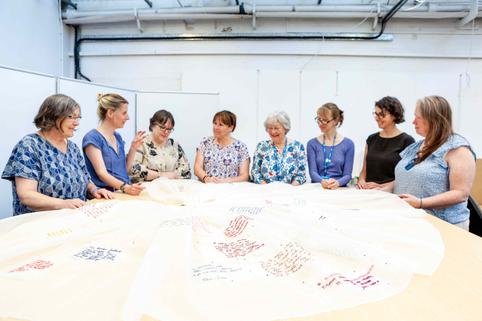Contemporary arts
We're home to a vibrant contemporary arts programme, supported by Arts Council England, featuring major artists and writers.
The Brontës are famous as writers, but they were interested in many art forms and have inspired successive generations of writers and artists. Our ambition is to reflect the Brontës' own remarkably diverse creative talents and the rich heritage of artistic response to their lives and works.

Through our contemporary arts programme, we commission and showcase new responses to the Brontës and our collection, from established and emerging writers and artists working today.
Previous collaborations have included Winston Plowes, Adrian McNally and The Unthanks, Cornelia Parker, Ian Humphreys, Clare Twomey, and Hannah Lamb. The resulting work has ranged from onsite installations and immersive experiences, to new writing, performances, and music.
We run an exciting programme of exhibitions, screenings, talks, readings, and lectures, as well as creative workshops for visitors to experience the legacy of the Brontës in imaginative ways.
Our events take place both in-person and online - so no matter where you're based, you can join us throughout the year.
Contemporary Women’s Writing
Charlotte, Emily, and Anne Brontë were pioneering female writers and continue to inspire contemporary literature.
We host a variety of contemporary women’s writing talks, readings, and workshops, with a focus on our annual Brontë Festival of Women’s Writing in September.
Previous guests have included Sally Wainwright, Kit de Waal, Tracy Chevalier, Kate Atkinson, Jackie Kay, Maggie O'Farrell, Jacqueline Wilson, Sara Collins, Fiona Mozley, Patience Agbabi, and Kate Mosse.

Get involved
We're open to submissions from artists and writers and are happy to discuss ideas. Please note, we only have a small exhibition space in the Museum Foyer and limited spaces within the Museum. In the first instance, please contact us through our enquiry form, here.
We also do open callouts for residencies or specific commissions, so keep an eye on our website, newsletter, and social channels for opportunities.
Find out more
Visit our 'What’s on' page for current exhibition and event listings, sign up to receive our newsletter, and follow us on social media.
